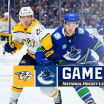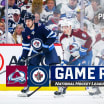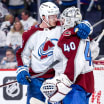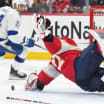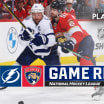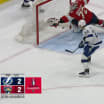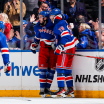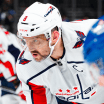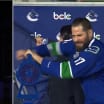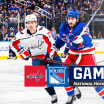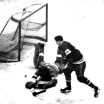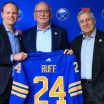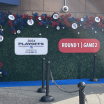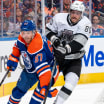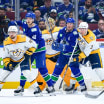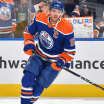For the first time since 2009, and the second time ever, Sidney Crosby of the Pittsburgh Penguins and Alex Ovechkin off the Washington Capitals will play against each other in the Stanley Cup Playoffs.
The Eastern Conference Semifinal seven years ago was an epic. It took seven games for the Penguins, on their way to the Stanley Cup, to prevail. In Game 2 of the series, Crosby and Ovechkin each scored a hat trick.
Before the 2015-16 season began, NHL.com Senior Writer Dan Rosen looked back at the Crosby-Ovechkin rivalry that has helped define the NHL for the past decade. With Game 1 of the Eastern Conference Second Round series between the Capitals and Penguins being played Thursday, NHL.com again highlights the moments that have shaped the rivalry and careers of Ovechkin and Crosby.
Crosby, Ovechkin meet again in second round
Superstars renew rivalry that's helped define NHL for more than a decade
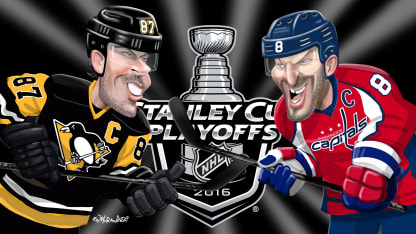
© Ed Murawinski
Sidney Crosby and Alex Ovechkin were in the spotlight, a place they had occupied individually throughout their hockey careers. This time, however, it was different. This time, they were sharing the attention, going head-to-head under the glare of the Stanley Cup Playoffs.
This was a defining moment.
"You could feel it," Washington Capitals center Nicklas Backstrom said. "You could feel that they were going after each other and trying to win the game for their team."
It was Game 2 of the 2009 Eastern Conference Semifinals, a series between the Pittsburgh Penguins and Capitals that was as much about the teams as it was about the stars, "The Ovi & Sid Show," the first, and until this season, only playoff edition.
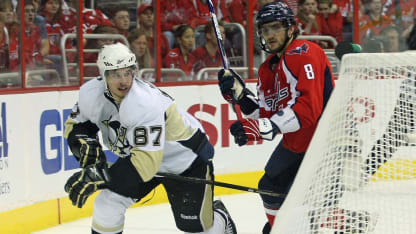
© Bruce Bennett/Getty Images
Crosby is from Canada, a center, a playmaker with incredible hands displaying skills unmatched this side of Gretzky and Lemieux.
Ovechkin is from Russia, a right wing whose game seems to sound different than everyone else's when he skates and shoots, power emanating from a motor that rarely stops or needs repair, a throwback to the days of Gordie Howe, only with greater flair and charisma.
They entered the NHL at the same time, each a No. 1 draft pick (Ovechkin in 2004, Crosby in 2005). They made their NHL debuts on the same night, Oct. 5, 2005.
The rivalry existed before they joined the NHL, forged in meetings on the international stage, including the gold-medal game of the 2005 IIHF World Junior Championship, won 6-1 by Crosby and Canada.
It grew during their first few NHL seasons as they vied for the title of best in the game, using each other's accomplishments (Ovechkin's Calder Trophy in 2006, Crosby's Hart Trophy and Art Ross Trophy in 2007, Ovechkin's Hart Trophy and Rocket Richard Trophy in 2008, and again in 2009) as motivation to be better than the other.
Then, in the 2009 Eastern Conference Semifinals, specifically Game 2, the rivalry exploded, with millions of fans left amazed and craving more.
"It was at that time that our rivalry [between the Penguins and Capitals] was the hottest, and that's all they were talking about, Sidney and Ovi," Backstrom said. "I remember that game. It was amazing."
That the Capitals won 4-3 is but a footnote to one of the most memorable nights of the past decade.
Ovechkin and Crosby each had a hat trick; they were the first players from opposite teams to do so in a playoff game in 13 years, since Trevor Linden (Vancouver Canucks) and Joe Sakic (Colorado Avalanche) in 1996. It has happened four times in NHL history. It hasn't happened since.
"We drove each other in that game," Crosby said.
Crosby scored first, a power-play goal at 6:38 of the first period to give Pittsburgh a 1-0 lead. Ovechkin answered with a tying goal at 2:18 of the second period. Crosby responded with his second goal at 10:57 to give the Penguins a 2-1 lead.
"When Sidney scored his second goal, Ovi didn't want to be worse than that," Backstrom said. "He was thinking, 'I've gotta get this and we need to win this game.'"
David Steckel 's tying goal for the Capitals 4:48 later was the bridge between the dueling hat tricks.
Ovechkin completed his with two goals less than three minutes apart in the third period to give Washington a 4-2 lead. Crosby scored his third goal on a power play at 19:29. With more time, Crosby said, he believes he would have scored again.
"That's two leaders showing up," Ovechkin said.
Ovechkin won the game. Crosby won the series, and, soon after, the Stanley Cup.
It still feels like hockey fans were the big winners that night, just as they have been countless nights since during the past decade.
"It's been great for the game, great for hockey," Backstrom said.
It will be great again over the next two weeks, when the rivalry that has simmered in recent years boils again with the Capitals and Penguins playing for the right to go to the Eastern Conference Final, starting with Game 1 on Thursday (8 p.m. ET; NBCSN, CBC, TVA Sports).
Crosby had eight points in a five-game first-round series against the New York Rangers and has 74 points in his past 59 games, all since Mike Sullivan took over as Penguins coach. He struggled at the start of the season, before the Penguins made the coaching change, but he's been arguably the MVP of the League since Christmas. The Penguins have won 18 of their past 21 games.
Ovechkin won the Rocket Richard Trophy this season with 50 goals, including a hat trick in the final regular-season game he played. He became the fifth-fastest player to reach 500 goals. He set the record for the most goals scored by a Russian player in the NHL, and he's coming off a six-game first-round series against the Philadelphia Flyers in which he had three goals and five points.
These polarizing superstars, different in many ways, unique in more, continue to deliver on the hype and expectations. Now they get to play for keeps once again, with Ovechkin trying to get to the Conference Final for the first time in his career and Crosby trying to win the Stanley Cup for the first time in six years.
Before they start it up, here's a look back at a dozen more memories, six for each player in chronological order, that have defined careers already among the best in NHL history:
THE DAY THAT CHANGED A FRANCHISE IN WASHINGTON
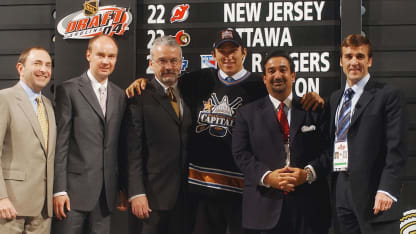
© Sara Davis/Getty Images
Ovechkin, 18 years old and determined as ever, pestered Gleb Chistyakov, the Capitals' Russian scout at the time of the 2004 NHL Draft, to tell him if he or Evgeni Malkin would be the No. 1 pick. Ovechkin never got an answer, which only added to his nerves when he arrived in Raleigh, N.C., on June 23, four days before the draft.
"I was like, 'C'mon, tell me, give me [an idea]," Ovechkin said. "He said, 'I can't tell you.' It was me and Malkin, both Russian guys, and when I saw the Russian scout go on stage with the Caps, I was like, 'What is going to happen right now?'"
Little did Ovechkin know he was the slam-dunk pick for the Capitals, the only choice for Ross Mahoney, their director of amateur scouting. Malkin went No. 2 to Pittsburgh.
"We never, ever would tip our hand, but there was no question it was Ovechkin," Mahoney said. "That's no disrespect to Malkin, but we were taking Ovechkin."
Ovechkin came on stage, shook hands with Washington's scouts and executives, put on his jersey and flashed his big smile. Owner Ted Leonsis, meeting Ovechkin for the first time, could feel the teen's heart pounding as they embraced.
"You knew you were in for a treat because he shook every hand like a politician," Leonsis said. "There was nothing introverted about him. At our post-draft event, he had never had cantaloupe and he was eating cantaloupe like you can't believe. He also shook a thousand hands and talked to everybody. It was like, 'Who is this guy?'"
SAVING THE FRANCHISE IN PITTSBURGH
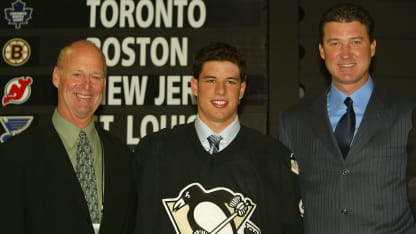
© Christian Petersen/Getty Images
There was no debate as to who would be the No. 1 pick in the 2005 draft. It was just a matter of which team would get Crosby.
The answer was determined in a draft lottery held July 22, the day the NHL and NHL Players' Association ratified the collective bargaining agreement to officially end the lockout that canceled the 2004-05 season.
"I was hoping whoever got that pick, I was going to go there, but I was probably more excited and anticipating what was going to happen than nervous," Crosby said.
The lottery went the Penguins' way. Word spread quickly.
"I was at my grandma's place and I forget who I was expecting to get it, but it wasn't that team," said Edmonton Oilers center Ryan Nugent-Hopkins , 13 years old at the time. "It's funny, I don't remember too many times exactly where I was at the time something happened, but that day I remember being at my grandma's place. It was special just because of Sidney, who he was."
The Penguins selected Crosby with the No. 1 pick in Ottawa on July 30. He was viewed as the savior for a franchise that a year earlier was suffering financial hardship with whispers of relocation.
Crosby made his NHL debut at the New Jersey Devils; he had an assist on Mark Recchi's power-play goal in the Penguins' 5-1 loss. Crosby finished his rookie season with 39 goals and 63 assists for 102 points; he was sixth in the League in scoring and seventh in assists. Crosby finished second in the Calder Trophy voting behind Ovechkin, who was third in goals (52) and points (106).
The Penguins all of a sudden had hope, even in a losing season.
"I saw someone, maturity-wise, who was out of this world," Recchi said. "His commitment to being an NHL player was incredible. You could see it in his face, his eyes, his demeanor. Then he did it on the ice. He had that aura about him. You just knew he was going to be a great player."
FROM RUSSIA WITH POWER
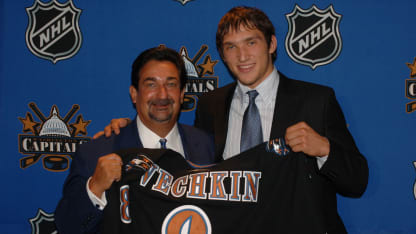
© Mitchell Layton/Getty Images
With the 2004-05 lockout extending into the summer and threatening the start of the 2005-06 season, Ovechkin signed a contract with Avangard Omsk in the Russia Super League (now the Kontinental Hockey League). The contract had an opt-out clause with a deadline of July 20.
The lockout didn't officially end until July 22, but news broke nine days earlier that an agreement between the NHL and NHLPA had been reached. Capitals general manager George McPhee and Leonsis immediately called Ovechkin.
"It was a situation that I had to think, 'Should I go to NHL or should I stay in Russia?'" Ovechkin said. "I was a little concerned because I promised Omsk that I'm going to stay one more year, but as soon as George and Ted called me and said the lockout was going to be over in two or three days, I came to the president of Omsk and I told him that it's my dream to go to the NHL."
McPhee recalled Ovechkin's persistence to start his NHL career, even in the face of resistance from his parents.
"I remember being on a conference call with Don Meehan, his agent at the time, a couple members of his staff, Ovi's parents, interpreters; it seemed like there were a lot of people on the call," McPhee said. "I remember trying to assure the parents that we were going to look after him. This is a 19-year-old guy coming to North America and it can be a little daunting. I felt most people on the call really thought that he'd be better off to play in Russia.
"So near the end of the call there were a lot of discussions between the Russians that we couldn't understand, but Alex seemed to be very, very animated and basically told everyone on the call, 'I'm going to the NHL.' That's it."
That night, Ovechkin went with Pavel Datsyuk and Ilya Bryzgalov to find a fax machine so each player could send his signed contract to his NHL team.
"It was 1 in the morning," Ovechkin said. "The next day I went to the general manager and owner of the team and I said I was leaving. Shook hands, picked up my stuff, and went."
He arrived in Washington for training camp and made an immediate impression on the Capitals.
"I went down to the locker room, and Olie Kolzig, who had won a Vezina Trophy, was our goalie then," Leonsis said. "He said, 'That's the greatest player I've ever seen. That's the hardest shot I've ever dealt with.' It was the first practice."
Ovechkin needed one shift in his first regular-season game to put his imprint on the NHL. He hit Columbus Blue Jackets defenseman Radoslav Suchy so hard into the end boards that it dislodged a support beam in the glass, knocking it to the ice. Ovechkin scored two goals in a 3-2 Washington win.
A career was born.
"I had never seen anyone hit like him or have people bounce off him when they were trying to hit him," McPhee said. "He would just attack, attack, attack, and if he wasn't going around you he'd go right through you. I had just never seen anything like it. [Eric] Lindros was similar, but that's in my recollection the only other player that could come into the League and play like that."
"THE GOAL"
Ovechkin's prominence paled in comparison to Crosby's during the first half of their first season. That changed on Jan. 16, 2006, when Ovechkin scored "The Goal" against the Phoenix Coyotes.
"That raised the attention of everybody," Leonsis said.
"I got a lot more respect after that," Ovechkin said.
It started as a simple play by Capitals defenseman Brendan Witt, who banked the puck off the boards in an attempt to clear it out of the defensive zone late in a game Washington was winning 5-1.
Ovechkin picked up the puck at center ice and had some speed as he carried it across the blue line. That's when things got very interesting.
"I made a move and I fell," Ovechkin said. "I think it was a toe pick."
Ovechkin started his move at the top of the right circle. Coyotes goalie Brian Boucher, uncertain if Ovechkin was going to try to use a snap shot through defenseman Paul Mara, started coming out of his crease to challenge.
"I wanted to be aggressive on him so when he came down I didn't get beat with his shot," Boucher said. "He ended up taking it, dragging it, going over Paul Mara."
Ovechkin fell and slid through the inside of the left circle toward the goal line. Boucher was too far out of his crease and had no way of getting back.
"I ended up diving out, stretching out my arms because I couldn't push anymore," Boucher said. "I didn't even realize he was on his back."
Ovechkin, spinning as he fell, somehow kept the puck on his stick, his eyes on the goal. With one hand, he somehow managed to shoot it into the net.
"All I thought was that he went from one part of the ice all the way to the other, but then I was like, 'This can't be happening,'" Boucher said. "You hate to give up another goal in a game like that, but when I saw the replay, I just thought, 'Unbelievable goal, just unbelievable.'"
A SEASON FOR THE AGES
Ovechkin likes to talk about who helped him score 65 goals in 2007-08, when he became the NHL's first 60-goal scorer since Mario Lemieux (69) and Jaromir Jagr (62) did it with the Penguins in 1995-96.
Ovechkin credits Bruce Boudreau, his coach at the time.
"Gave us freedom," Ovechkin said.
He lauds his linemates, Backstrom and Viktor Kozlov.
"The skill was unbelievable," Ovechkin said.
Defenseman Mike Green knows better than to praise others before Ovechkin. It was, after all, Ovechkin who helped the Capitals win their first Southeast Division title since 2000-01 and reach the Stanley Cup Playoffs for the first time since 2002-03.
"It's hard to pinpoint certain goals because he had so many, but I remember the calmness and swagger he had every time he came onto the ice and off the ice," said Green, who was playing his third of 10 seasons with Ovechkin. "His presence, he just had everything going on. If he was playing poker, he couldn't lose. I mean, everything was going his way."
Green remembers it as being the first time he saw Ovechkin use everything in his arsenal.
"He always had a good shot, but that's when he was really digging down and as soon as he got the puck he was shooting it," Green said. "Really, nobody could stop him. He was just on fire. That's when he really became very comfortable with where he was at. He was skilled and he was determined, but that third year, there was no sweat off his back, he was just in it. There was no holding him back."
That season started a run of four consecutive division titles for the Capitals. It was also the season that Ovechkin committed himself fully to Washington.
A HISTORIC CONTRACT
McPhee recognized early in the summer of 2007 that the Capitals needed to start negotiating with Ovechkin, who was entering the final season of his three-year entry-level contract.
"Alex flew to Paris, I flew to Paris, and we spent a couple days there and talked about some things," McPhee said. "We were talking about a five-year deal."
Ovechkin was interested in something bigger, something louder, something in-your-face. Nothing No. 8 does is ever small or quiet.
"Early in that season we met and it was at that point that he said, 'If the contract is right, I'll sign a deal and spend my whole career in Washington, if you want to talk in those terms,'" McPhee said. "I recognized at that point that I have to get to ownership."
The negotiation played out across the next several months. McPhee said the first offer to Ovechkin was a 12-year contract in the neighborhood of $100 million. They talked some more and eventually settled on a 13-year, $124 million contract on Jan. 10, 2008.
"Mrs. Ovechkin asked me to step aside, she looked me in the eye, put her two hands on both of my shoulders, and said, 'George, is this a good contract?'" McPhee said. "I said, 'This is a great contract.' With that, she was satisfied, Alex was happy and the deal was done."
It is still the richest total-value contract in NHL history. (Crosby signed a 12-year, $104.4 million contract on July 1, 2012).
"He showed confidence in the city and in the fan base, and now there is a generation of fans rocking the red and totally into it," Leonsis said. "It all tipped from that moment, from that contract. It became, 'If D.C. is good enough for Alex, it's good enough for me.'"
A WIN, A PARADE, A DREAM COME TRUE
Nathan MacKinnon , less than a month shy of his 14th birthday, walked out of his house on Aug. 7, 2009, and into a sea of people, enough to triple the population of Cole Harbour, Nova Scotia.
Crosby brought the Stanley Cup home, celebrating the Penguins' 2009 championship on the day he turned 22.
Estimates put the crowd at 75,000 to see Crosby and the Cup for his parade. More than 25,000, the estimated population of the town, were waiting at Cole Harbour Place, where Crosby (and later MacKinnon, now with the Colorado Avalanche) learned to play hockey.
"He had a big parade and I definitely went to check it out," MacKinnon said. "It was cool. Obviously he was a pretty big deal from a very young age in my area. Everyone went out to see it."
People from as far as Alberta flew into Halifax to be there for Crosby's day.
"I was the little kid waving at him," said MacKinnon, now close friends with Crosby. "I was on a street that was just packed on both sides. There were so many people. We were all pretty lucky."
Crosby, who had 31 points in 24 games during those playoffs, used to dream of winning the Stanley Cup. Bringing it home for a parade on his birthday was never part of that dream. That's what made it even more special.
"Your community and everybody who supports you growing up, you can say 'Thank you' as much as you want, but being able to do that was probably the best way I can say 'Thank you,'" Crosby said. "That was just as good as it gets."
CANADA'S GOLDEN BOY
The puck came to Crosby, off the stick of Jarome Iginla . There was no time for thought, just instinct. As usual, Crosby's was spot-on. The result was pandemonium across Canada.
Crosby's overtime goal in the gold-medal game against the United States at the 2010 Vancouver Olympics was the country's biggest since Paul Henderson became a national hero 38 years earlier for his Summit Series winner.
"It was like, 'Did that just really happen? Did Sidney Crosby of all people just score the golden goal?'" said Tampa Bay Lightning captain Steven Stamkos , who was 19 and watching from his living room. "I jumped off of my couch when that went in, but I think a lot of people were like, 'Could you write a better script than Canada's golden boy scoring a golden goal?' I think that was pretty fitting."
Crosby vividly recalls the moments leading to the goal: Zach Parise 's tying goal for the United States with 25 seconds remaining in the third period and the speeches of Canada coach Mike Babcock and captain Scott Niedermayer in the dressing room before overtime.
"We're kind of thinking the opportunity of a lifetime might have just went away," Crosby said. "But by the time we went back out there I really felt we had the mentality that we were going to go after it, nobody was sitting back."
Crosby was mobbed by his teammates after scoring. He had no idea of the celebrations going on outside.
"It didn't really sink in probably until I got out of the rink, to be honest with you," he said. "You see the city and everything that was going on, it was pretty fun. I was just in the right place and Jarome made a great pass. It wasn't anything special, but one of those quick plays, and obviously it led to an unbelievable experience."
A RIVALRY IS HALTED
On a cold, rainy New Year's night in Pittsburgh, the 2011 Bridgestone NHL Winter Classic was being played at sold-out Heinz Field. Crosby vs. Ovechkin was on a new stage under a new spotlight.
But the rivalry would soon be put on hold, although nobody knew it at the time. Crosby was hit by Steckel late in the second period, finished the Winter Classic and played in the next game. But something wasn't right.
"The next morning [Jan. 6, 2011], after we got to Montreal, was when we first talked about signs of him not feeling well," then-Penguins coach Dan Bylsma said. "I think we flew him back to Pittsburgh after breakfast."
Crosby, believed to have sustained a concussion, was out of action for nearly 11 months.
"I've had great experiences, all these things, and one little play and you're watching for a while," Crosby said. "I always felt I never took it for granted, but I think now I definitely have a greater appreciation, probably more than I ever did."
Crosby didn't play again until Nov. 21 of the following season.
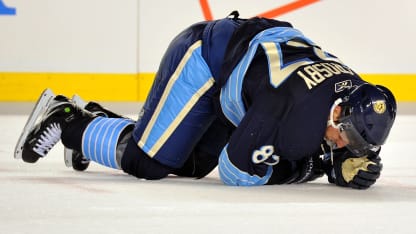
© Brian Babineau/Getty Images
"WELCOME BACK SID"
The 18,571 fans at Consol Energy Center on Nov. 21, 2011 were given signs that read "Welcome Back Sid." The pregame video on the scoreboard was all about Crosby, his most memorable moments with the Penguins.
This was Crosby's night, his first game since Jan. 5. Everywhere in Pittsburgh, people were talking about his return against the New York Islanders.
"I remember the buzz," Bylsma said. "Without a question it was the biggest buzz of a regular-season game that I think I have ever been a part of, especially one in November."
Crosby scored two goals and finished with four points in Pittsburgh's 5-0 win.
"I think it was possibly one of the greatest performances by an individual in a game that I have ever watched," Bylsma said. "We had a couple new players that had not played with Sidney Crosby in James Neal and Steve Sullivan, and I remember them and their reaction to the game. By the end of the game they were complete spectators, just amazed and flabbergasted by what they were watching."
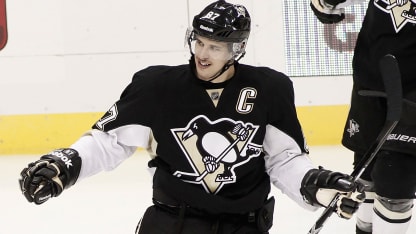
© Jared Wickerham/Getty Images
Islanders center John Tavares was also left marveling at Crosby's performance.
"It was like [Crosby] hadn't missed a beat," Tavares said. "You could tell right from the drop of the puck how determined he was. You could tell the jump he had early. The first goal he scored was absolutely brilliant. He drove the ice, beat our defenseman wide and roofed one of his famous backhanders into the corner."
Crosby's return lasted eight games before another concussion sidelined him, this time for nearly 3 ½ months before he returned March 15.
"It was great just being able to come back and play, compete, to do the only thing you want to do," Crosby said. "Then being able to go out there and have that type of game, be emotional like that, it was special. It didn't last that long, but it was good while it lasted."
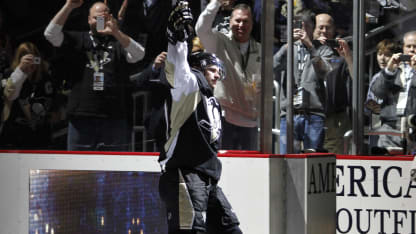
© Justin K. Aller/Getty Images
SOCHI NOT SO GREAT FOR NO. 8
Ovechkin's passion and pride for Russia, and for playing on the national team, runs so deep that nine times in his 10 NHL seasons he has put off his summer vacation to play in the IIHF World Championship.
"He knows his role," Leonsis said.
Ovechkin and Russia have not been successful in the past two Olympic hockey tournaments, unlike Canada, which has won gold twice with Crosby anchoring its top line.
That's why the 2014 Sochi Olympics meant so much to Ovechkin. The hockey tournament was his calling, but his role as Russia's most popular athlete made him the face for the most expensive and most lavish Olympics.
"He's like the second-most popular guy in the whole country," Capitals center Evgeny Kuznetsov said. "[President Vladimir] Putin is first, and Alex is second. Everyone wants to be like Alex."
Ovechkin's popularity spilled into the hype for the Olympics. Not only was he an ambassador for the Games, he was the first Russian to carry the Olympic torch, at a ceremony that took place in the ruins of the 2,600-year-old Temple of Hera at Olympia, Greece on Sept. 29, 2013.
"A huge honor," Ovechkin said. "I love my country and the opportunity that I had, to carry the torch, I was going to do it no matter what. The team said, 'OK.' Just to be in that position, when you're the first guy carrying the torch in the whole country, I mean, unbelievable."
Five months later, Ovechkin was heading back to Washington without a medal and filled with disappointment. The Olympics that were supposed to signify Russia's return to international hockey dominance ended in misery.
Russia was eliminated in the quarterfinals by Finland. Four days later, Crosby won the gold medal with Canada.
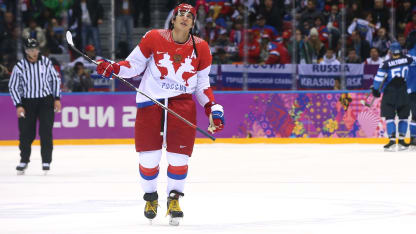
© Bruce Bennett/Getty Images
Ovechkin faded under the pressure in the same manner as his teammates and managed one goal. The pain lingers, but he said he gained perspective in reflection.
"You grow up, you move forward," he said. "I know the fans, the people, everyone was disappointed, but when it's over, it's over."
St. Louis Blues forward Vladimir Tarasenko was part of the Russian team and knows of the disappointment, but he left Sochi with a greater appreciation for Ovechkin.
"I went there thinking, you know, he's won a lot of awards in the NHL and maybe he would be a cocky guy, but when we talked first time he was really good to me," Tarasenko said. "It meant a lot. It's great to have some success and stay the same guy he was before. I think everybody respects these people, and Alex is that type of guy. He always helps everybody."
He just couldn't help Russia the way Crosby helped Canada.
CAPTAIN CANADA, DOUBLE GOLD
Four years after scoring the goal that gave Canada the gold medal in Vancouver, Crosby was the captain in Sochi.
He didn't have to be an overtime star, didn't have to create any lasting memory. Crosby just had to be steady, reliable, professional, a leader on a team that dominated an Olympic tournament like no other.
Canada allowed three goals in six games and fewer than 22 shots per game. That Crosby had three points mattered little. He scored his only goal of the tournament in the second period of a 3-0 win against Sweden in the gold-medal game.
"He won. That's what we went for," Babcock said. "Would people have been happy if he got 12 points and we lost? That's not what we went there for. We went there to win. It was the most dominant of any team ever, and he was a huge part of that. He won."
A winning legacy is what Crosby wants to leave when he walks away from the game. It's the legacy Ovechkin is trying to create. He has a chance now, perhaps his best chance ever, and it's fitting that No. 87 of the Pittsburgh Penguins is standing in his way.
